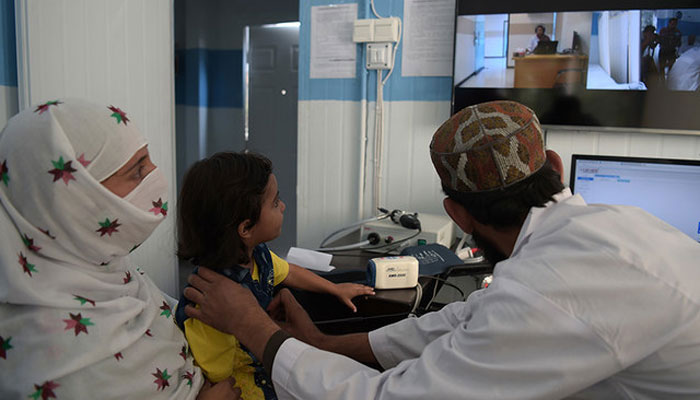‘Non-communicable diseases among top three causes of death for children aged 10-14 years’
Non-communicable diseases (NCDs) are among the top three causes of death for children aged 10-14 in Pakistan and are the leading cause of death for girls between the ages of 15 and 19, experts revealed on Thursday.
They emphasized the urgent need for parents, caregivers, teachers, mentors and young people to prioritise the physical and mental health of adolescents. Speaking at a three-day conference organised by the Aga Khan University’s Department of Community Health Sciences (CHS) in collaboration with the World Health Organisation (WHO) and the United Nations Children’s Emergency Fund (Unicef), experts also highlighted the necessity of collaborative efforts to encourage young people to lead healthy and active lifestyles.
The conference, titled “Healthy Futures: Preventing Non-Communicable Diseases (NCDs) in Young Hearts and Minds,” addressed critical and often overlooked topics such as screen time, obesity, substance use and abuse, mental health problems, sedentary lifestyles, educational curricula, and lifestyle innovations that need widespread implementation to counter these troubling trends.
Dr Fouzia Khan, chief executive advisor of the School Education Department, Government of Sindh, stated that promoting a healthy and active lifestyle among young people requires significant efforts from parents, teachers, and other social institutions. She added that acknowledging the current state of our youth is the first step towards lifestyle modifications for a better future.
The three-day conference featured research presentations, panel discussions, plenary talks, and various activities designed to foster dialogue among academic experts, healthcare professionals, and teachers.
Dr Lamia Mehmud, regional adviser for non-communicable diseases prevention at WHO, emphasized the need for a coalition of pioneering health faculties with local governments and grassroots mentors to reach young people. "It’s vital for our young ones to enjoy their lives, but we need to teach them how to avoid risking their wellbeing for the sake of fun or comfort," Dr Lamia added.
Adolescents constitute one-fifth of the Eastern Mediterranean Region's population, representing a crucial developmental stage. WHO emphasizes prioritizing adolescent health to combat NCDs, which are responsible for over half of disability-adjusted life years (DALYs) and 20% of deaths among those aged 10-19. The Youth Health Council engages youths in NCD prevention strategies.
In addition to research and dialogue, the conference provided opportunities for young people to explore and engage in informative activities and exhibits about non-communicable diseases, their consequences, and how small lifestyle changes can significantly improve their health.
Abdullah A. Fadil, Unicef’s representative in Pakistan, stressed the importance of connecting and relating to pre-teens and teens rather than isolating them. "Non-communicable diseases (NCDs) are among the top three causes of death for children aged 10-14 in Pakistan and are the leading cause of death for girls between the ages of 15 and 19. There is an urgent need for parents, caregivers, teachers, mentors, and young people themselves to prioritize physical and mental health of adolescents.
He emphasized the need for immediate actions by individuals and educational institutions to safeguard young hearts and minds from NCDs.
These actions include increasing physical activity, decreasing screen time, choosing more nutritious foods, limiting substance use, allocating more resources to mental health services, reducing air pollution, and incorporating age-appropriate climate change, mental health, and physical education into the national curriculum.
The conference also highlighted the importance of addressing NCDs in teens, which requires attention from governing bodies and the scientific community. Additionally, it addressed pressing concerns such as climate emergencies and the availability of public spaces.
Dr Romaina Iqbal, section head of NCD and Mental Health, Department of CHS, stated, "Evidence suggests that 70% of the poor habits that lead to NCDs later in life are developed during adolescence. Aga Khan University is committed to educating adolescents about the dangers of sedentary and unhealthy lifestyles. With promising collaborations between public and private entities, we are confident we can divert our young population from unhealthy behaviors."
Prof Zainab Samad, chair of the Department of Medicine, emphasized that “Prevention is better than treatment. Poor diet, physical inactivity, tobacco consumption, climate change, and poor mental health are all associated with the development of NCDs in the Pakistani population. It is therefore important to modify all these factors to prevent the development of NCDs.”
-
 What's Buzzing Around TikTok's 'PineDrama' App: Everything You Need To Know
What's Buzzing Around TikTok's 'PineDrama' App: Everything You Need To Know -
 Who’s Next After Australia’s Under-16s Social Media Ban?
Who’s Next After Australia’s Under-16s Social Media Ban? -
 Do You Have Depression Or Is It Just Monday Blues? Find Out Where Science Stands
Do You Have Depression Or Is It Just Monday Blues? Find Out Where Science Stands -
 Why Claude Is Gaining Momentum In Revolutionizing The AI Landscape
Why Claude Is Gaining Momentum In Revolutionizing The AI Landscape -
 Elon Musk Unveils Plans To Take Humanity To The Moon And Mars
Elon Musk Unveils Plans To Take Humanity To The Moon And Mars -
 Air Pollution May Play A Role In Prostate Cancer Risk, Experts Warn
Air Pollution May Play A Role In Prostate Cancer Risk, Experts Warn -
 Royal Expert Reveals Real Reason King Charles Won't Meet Prince Harry Next Week
Royal Expert Reveals Real Reason King Charles Won't Meet Prince Harry Next Week -
 Ansel Elgort Welcomes His First Baby In Secret
Ansel Elgort Welcomes His First Baby In Secret -
 Startup Aims To Brighten Night Skies With Space Mirrors
Startup Aims To Brighten Night Skies With Space Mirrors -
 Cheaper Cars, Fewer EVs: Trump Administration Shifts ‘auto Policy’ Focus
Cheaper Cars, Fewer EVs: Trump Administration Shifts ‘auto Policy’ Focus -
 Meghan Markle Takes 'breadwinner' Role In Prince Harry's California Life
Meghan Markle Takes 'breadwinner' Role In Prince Harry's California Life -
 Type 2 Diabetes Hidden Trigger In Daily Food Revealed
Type 2 Diabetes Hidden Trigger In Daily Food Revealed -
 Vertical Tabs Coming To Google Chrome
Vertical Tabs Coming To Google Chrome -
 Jane Seymour Reveals THIS Beloved Romance Was 'worst-reviewed' Movie Ever
Jane Seymour Reveals THIS Beloved Romance Was 'worst-reviewed' Movie Ever -
 European Leaders Slam Trump’s Tariff Threat Over Greenland As ‘unacceptable’
European Leaders Slam Trump’s Tariff Threat Over Greenland As ‘unacceptable’ -
 Princess Eugenie Leaves Father Andrew 'devastated' With Big Step: 't's Brooklyn Beckham Level'
Princess Eugenie Leaves Father Andrew 'devastated' With Big Step: 't's Brooklyn Beckham Level'




